American Signal Corporation: Difference between revisions
ArxCyberwolf (talk | contribs) (Moved page over from the CDS Wiki.) |
ArxCyberwolf (talk | contribs) (Added images.) |
||
| (2 intermediate revisions by the same user not shown) | |||
| Line 7: | Line 7: | ||
== History == | == History == | ||
[[File:Big Mouth.jpg|left|thumb|248x248px|The original 1990s "mascot" of American Signal, known as "Earl E. Warning" or "Big Mouth". This mascot would be dropped by the mid-2000s.]] | |||
''tba'' | ''tba'' | ||
| Line 18: | Line 19: | ||
''Main article: [[ACA Alertronic]]'' | ''Main article: [[ACA Alertronic]]'' | ||
The '''Alertronic''' was a series of sirens carried over from ACA. Under ASC, the Alertronic line would remain largely the same as it was during the ACA era, though with several minor changes, such as now adorning ASC's standard light gray paint and nomenclature changes, particularly in 1994 when the [[ | The '''Alertronic''' was a series of sirens carried over from ACA. Under ASC, the Alertronic line would remain largely the same as it was during the ACA era, though with several minor changes, such as now adorning ASC's standard light gray paint and nomenclature changes, particularly in 1994 when the [[ASC i-FORCE|Quadren]] would be renamed to the i-FORCE and the AR-1600 would be renamed to the RE-1600. The Alertronic line would remain unchanged for the rest of its lifespan before being phased out in 2011. | ||
[[File:AL-1000.png|left|thumb|160x160px|AL-1000 and 2000]] | |||
====== AL-1000 ====== | ====== AL-1000 ====== | ||
| Line 25: | Line 27: | ||
====== AL-2000 ====== | ====== AL-2000 ====== | ||
The '''AL-2000''' is a directional electronic sirens, which are essentially an AL-4000 cut in half. They make use of 4 Atlas CJ-46 fiberglass paging horns attached to a rectangular aluminum housing which contains the wiring and speaker drivers. The AL-2000 is visually identical to the AL-1000, but differs on the inside by doubling the number of drivers, with 2 100 W drivers per horn for a total of 800 W. There is a removable panel on one side of the siren, which allows access to the internals. The design of the AL-1000 and AL-2000 allowed for different directional configurations by removing speakers on one or more sides. The AL-2000 reaches 112 dB at 100 ft. | The '''AL-2000''' is a directional electronic sirens, which are essentially an AL-4000 cut in half. They make use of 4 Atlas CJ-46 fiberglass paging horns attached to a rectangular aluminum housing which contains the wiring and speaker drivers. The AL-2000 is visually identical to the AL-1000, but differs on the inside by doubling the number of drivers, with 2 100 W drivers per horn for a total of 800 W. There is a removable panel on one side of the siren, which allows access to the internals. The design of the AL-1000 and AL-2000 allowed for different directional configurations by removing speakers on one or more sides. The AL-2000 reaches 112 dB at 100 ft. | ||
[[File:Alertronic AL-4000.jpg|left|thumb|160x160px|AL-4000]] | |||
====== AL-4000 ====== | ====== AL-4000 ====== | ||
The '''AL-4000''' is a directional electronic siren, and was advertised as a cheaper alternative to the Alertronic 5000 when it was first released. The AL-4000 is a simple electronic siren, with 8 Atlas CJ-47 fiberglass paging horns attached to a cubical aluminum housing which contains the wiring and speaker drivers. The AL-4000 was available without the square housing, with each speaker array's drivers being contained in individual smaller housings. This made it able to face in more than 4 directions, and made it look very similar to a [[Federal Signal DSA|DSA]] or [[Whelen WS-2000|WS-2000]]. The AL-4000 contains 16 100 W speaker drivers, with two attached to each horn for a total of 1600W. There are 2 horns on each side of the housing. There is a removable panel on one side of the siren, which allows access to the internals, and the design of this siren allowed for different directional configurations by removing speakers on one or more sides. The AL-4000 reaches 116 dB at 100 ft. | The '''AL-4000''' is a directional electronic siren, and was advertised as a cheaper alternative to the Alertronic 5000 when it was first released. The AL-4000 is a simple electronic siren, with 8 Atlas CJ-47 fiberglass paging horns attached to a cubical aluminum housing which contains the wiring and speaker drivers. The AL-4000 was available without the square housing, with each speaker array's drivers being contained in individual smaller housings. This made it able to face in more than 4 directions, and made it look very similar to a [[Federal Signal DSA|DSA]] or [[Whelen WS-2000|WS-2000]]. The AL-4000 contains 16 100 W speaker drivers, with two attached to each horn for a total of 1600W. There are 2 horns on each side of the housing. There is a removable panel on one side of the siren, which allows access to the internals, and the design of this siren allowed for different directional configurations by removing speakers on one or more sides. The AL-4000 reaches 116 dB at 100 ft. | ||
[[File:AL-6000.png|left|thumb|160x160px|AL-6000]] | |||
====== AL-6000 ====== | ====== AL-6000 ====== | ||
The '''AL-6000''' is directional electronic siren, essentially being an AL-8000 with the top 4 speakers removed. It shares the same housing as the AL-8000 to save on costs. Due to this, the horn mounts are visible where the horns would have been mounted. The AL-6000 makes use of 12 Atlas CJ-46 fiberglass paging horns attached to a tall rectangular aluminum housing, with three horns on each side. The siren used 2 100 W speaker compression drivers per horn, for a total of 2400 W. There is a removable panel on one side of the siren, which allows access to the internals, and the design of this siren allowed for different directional configurations by removing speakers on one or more sides. The AL-6000 reaches 121 dB at 100 ft. | The '''AL-6000''' is directional electronic siren, essentially being an AL-8000 with the top 4 speakers removed. It shares the same housing as the AL-8000 to save on costs. Due to this, the horn mounts are visible where the horns would have been mounted. The AL-6000 makes use of 12 Atlas CJ-46 fiberglass paging horns attached to a tall rectangular aluminum housing, with three horns on each side. The siren used 2 100 W speaker compression drivers per horn, for a total of 2400 W. There is a removable panel on one side of the siren, which allows access to the internals, and the design of this siren allowed for different directional configurations by removing speakers on one or more sides. The AL-6000 reaches 121 dB at 100 ft. | ||
[[File:AL-8000.png|thumb|160x160px|AL-8000]] | |||
====== AL-8000 ====== | ====== AL-8000 ====== | ||
The '''AL-8000''' is the largest directional siren in the Alertronic series, essentially being two AL-4000s stacked on top of each other with a single rectangular housing. The AL-8000 shares the same housing as the AL-6000 which contains the siren's wiring and drivers, with 16 Atlas CJ-46 fiberglass paging horns attached to the housing, 4 horns being on each side. The siren uses 32 100 W speaker compression drivers, with 2 drivers attached to each horn, for a total of 3200 W. There is a removable panel on one side of the siren, which allows access to the internals, and the design of this siren allowed for different directional configurations by removing speakers on one or more sides. The AL-8000 reaches 126 dB at 100 ft. | The '''AL-8000''' is the largest directional siren in the Alertronic series, essentially being two AL-4000s stacked on top of each other with a single rectangular housing. The AL-8000 shares the same housing as the AL-6000 which contains the siren's wiring and drivers, with 16 Atlas CJ-46 fiberglass paging horns attached to the housing, 4 horns being on each side. The siren uses 32 100 W speaker compression drivers, with 2 drivers attached to each horn, for a total of 3200 W. There is a removable panel on one side of the siren, which allows access to the internals, and the design of this siren allowed for different directional configurations by removing speakers on one or more sides. The AL-8000 reaches 126 dB at 100 ft. | ||
[[File:RE-1600.png|left|thumb|160x160px|RE-1600]] | |||
====== RE-1600 ====== | ====== RE-1600 ====== | ||
The '''RE-1600''' is a rotational electronic siren, utilizing high-powered speaker drivers located in the back panel of the siren to amplify the sounds from the controller. The RE-1600 uses 16 100 W drivers for a total of 1600 W, with two drivers paired into each of the siren's 4 "throats" which connect to the siren's singular horn and allows the siren to reach 125 dB at 100 ft. The siren is rotated with a separate motor and gear reduction drive which drives a chain inside of the lower enclosure that rotates the entire siren unit 360°. The RE-1600 makes use of collector rings, which means it doesn't have to oscillate. However, this also means that the siren may cut out or glitch if the rings are dirty. | The '''RE-1600''' is a rotational electronic siren, utilizing high-powered speaker drivers located in the back panel of the siren to amplify the sounds from the controller. The RE-1600 uses 16 100 W drivers for a total of 1600 W, with two drivers paired into each of the siren's 4 "throats" which connect to the siren's singular horn and allows the siren to reach 125 dB at 100 ft. The siren is rotated with a separate motor and gear reduction drive which drives a chain inside of the lower enclosure that rotates the entire siren unit 360°. The RE-1600 makes use of collector rings, which means it doesn't have to oscillate. However, this also means that the siren may cut out or glitch if the rings are dirty. | ||
[[File:ASC Quadren.png|thumb|213x213px|Quadren]] | |||
====== Quadren ====== | ====== Quadren ====== | ||
| Line 42: | Line 49: | ||
Originally released in 1992, the '''Quadren''' was a very unique siren designed to act as both a directional and an omnidirectional siren, whichever is required. While similar in appearance to a Modulator or a Whelen omnidirectional, its internal design is completely different. Unlike other stacked-cell sirens, the Quadren only has speaker compression drivers in every other cell, with the sound being projected out of both the top and bottom of each active cell using horns inside the cells. Each active cell has half of a dummy cell on the top and bottom which forms an entire dummy cell in between each active cell when stacked, which forms the projectors through its shape. Each active cell quadrant has a removable panel to easily access and replace faulty drivers. Each active cell in a Quadren is formed by four separate quadrants, which when 4 of them are put together form an entire cell. The Quadren would be sold until 2005, when it was redesigned to its current form, the ASC i-FORCE. | Originally released in 1992, the '''Quadren''' was a very unique siren designed to act as both a directional and an omnidirectional siren, whichever is required. While similar in appearance to a Modulator or a Whelen omnidirectional, its internal design is completely different. Unlike other stacked-cell sirens, the Quadren only has speaker compression drivers in every other cell, with the sound being projected out of both the top and bottom of each active cell using horns inside the cells. Each active cell has half of a dummy cell on the top and bottom which forms an entire dummy cell in between each active cell when stacked, which forms the projectors through its shape. Each active cell quadrant has a removable panel to easily access and replace faulty drivers. Each active cell in a Quadren is formed by four separate quadrants, which when 4 of them are put together form an entire cell. The Quadren would be sold until 2005, when it was redesigned to its current form, the ASC i-FORCE. | ||
[[File:New i-FORCE 1600.png|left|thumb|160x160px|i-FORCE]] | |||
===== i-FORCE ===== | ===== i-FORCE ===== | ||
| Line 47: | Line 55: | ||
Originally known as the Quadren, the '''i-FORCE''' is a series of omnidirectional electronic sirens that were redesigned to their current form in 2005. Each active cell contains 8 Atlas 100 W drivers, with a "dummy" bottom cell that projects the sound from the lowest active cell. The i-FORCE is available with up to 4 active cells, for a total of 3200 W. There are 4 models available, the STi-800, STi-1600, STi-2400, and STi-3200. ASC also refers to these sirens as simply the i-FORCE 800, 1600, 2400, and 3200. The i-FORCE runs on 24 V DC, and is voice and battery backup capable. The i-FORCE continues to be sold to this day and is the least popular out of the stacked-cell electronic sirens. However, it still performs strongly, and ASC appears to be hard at work improving upon the design according to teasers from the company itself. | Originally known as the Quadren, the '''i-FORCE''' is a series of omnidirectional electronic sirens that were redesigned to their current form in 2005. Each active cell contains 8 Atlas 100 W drivers, with a "dummy" bottom cell that projects the sound from the lowest active cell. The i-FORCE is available with up to 4 active cells, for a total of 3200 W. There are 4 models available, the STi-800, STi-1600, STi-2400, and STi-3200. ASC also refers to these sirens as simply the i-FORCE 800, 1600, 2400, and 3200. The i-FORCE runs on 24 V DC, and is voice and battery backup capable. The i-FORCE continues to be sold to this day and is the least popular out of the stacked-cell electronic sirens. However, it still performs strongly, and ASC appears to be hard at work improving upon the design according to teasers from the company itself. | ||
[[File:E-Class.png|left|thumb|160x160px|E-Class]] | |||
===== E-Class ===== | ===== E-Class ===== | ||
''Main article: [[ASC E-Class]]'' | ''Main article: [[ASC E-Class]]'' | ||
The '''E-Class''' is a series of directional electronic sirens that is produced by the American Signal Corporation. Very similar in appearance to the [[Acoustic | The '''E-Class''' is a series of directional electronic sirens that is produced by the American Signal Corporation. Very similar in appearance to the [[Acoustic Technology, Inc.|ATI HPSS]] (and often confused with such), the E-Class is ASC's budget electronic siren offering. The E-Class series was introduced sometime around 2007, as a cheaper electronic alternative to the i-FORCE. These sirens make use of 1-8 speakers per array, with a maximum of 8 speakers being supported. The speakers were supplied by DKTec, based out of Taiwan, and are the same speakers used for many other electronic sirens. Each speaker contains 4 100 W speaker compression drivers, manufactured by Atlas, with a maximum of 3200 W being supported. Each unit comes with a standard ASC controller, which includes battery backup and voice capabilities alongside ASC's standard siren tones. These sirens are not very common as ASC has failed to establish themselves into the electronic siren market as effectively as its competitors such as Whelen's [[Whelen WPS-2900|WPS-2900]] and Federal Signal's [[Federal Signal Modulator|Modulator]] and [[Federal Signal DSA|DSA]], but where they are found, they are quite effective. Due to their better controller and drivers, these sirens often outperform and are more reliable than their closest competitor, the ATI HPSS series. | ||
[[File:Clarity siren2.png|left|thumb|194x194px|Clarity]] | |||
===== Clarity ===== | ===== Clarity ===== | ||
| Line 65: | Line 75: | ||
The '''Omnidirectional Mechanical''' ('''OM''') series was ASC's rebranding of ACA's Screamer and Banshee lines of sirens, streamlining and combining both into one series. The OM series included the OM-102 (Screamer S-2), OM-109 (S-5), OM-112 (S-7.5), OM-117 (Banshee 115) and OM-120 (Performance Plus Banshee). The streamlining included the discontinuation of the Screamer S-10 (which was redundant) and the 9/12-port dual tone option on the Banshee 115. OM series sirens are largely identical to their ACA counterparts, though painted in light gray with ASC's blue rectangular logo. The OM series was discontinued in 2004, being replaced by the Tempest line of sirens. | The '''Omnidirectional Mechanical''' ('''OM''') series was ASC's rebranding of ACA's Screamer and Banshee lines of sirens, streamlining and combining both into one series. The OM series included the OM-102 (Screamer S-2), OM-109 (S-5), OM-112 (S-7.5), OM-117 (Banshee 115) and OM-120 (Performance Plus Banshee). The streamlining included the discontinuation of the Screamer S-10 (which was redundant) and the 9/12-port dual tone option on the Banshee 115. OM series sirens are largely identical to their ACA counterparts, though painted in light gray with ASC's blue rectangular logo. The OM series was discontinued in 2004, being replaced by the Tempest line of sirens. | ||
====== OM-102 ====== | ====== OM-102 (Screamer S-2) ====== | ||
The OM-102 is ASC's rebranded version of the Screamer S-2. The OM-102 is identical to the Screamer S-2 besides its paint, which is gray in colour. The OM-102 consists of a 9-port single tone rotor and stator driven by a 2.5 hp AC electric motor. The OM-102 was available in single or three-phase. | |||
====== OM-109 ====== | ====== OM-109 (Screamer S-5) ====== | ||
The OM-109 is ASC's rebranded version of the Screamer S-5. The OM-102 is identical to the Screamer S-5 besides its paint, which is gray in colour. The OM-102 consists of a 9-port single tone rotor and stator driven by a 5 hp AC electric motor. The OM-102 was available in single or three-phase. | |||
====== OM-112 ====== | ====== OM-112 (Screamer S-7.5) ====== | ||
The OM-112 is ASC's rebranded version of the Screamer S7.5. The OM-102 is identical to the Screamer S-7.5 besides its paint, which is gray in colour. The OM-102 consists of a 9-port single tone rotor and stator driven by a 7.5 hp AC electric motor. The OM-102 was available in single or three-phase. | |||
====== OM-117 ====== | ====== OM-117 (Banshee 115) ====== | ||
The OM-117 is ASC's rebranded version of the Banshee 115. The OM-117 is identical to the Banshee 115 besides its paint which is gray in colour. The OM-102 consists of an 8-port single tone rotor and stator driven by a 10 hp AC electric motor. Unlike the Banshee 115, the OM-117 was not offered in 9/12-port dual tone. The OM-117 was available in single or three-phase. | |||
====== OM-120 ====== | ====== OM-120 (Performance Plus Banshee) ====== | ||
The OM-120 is ASC's rebranded version of the Performance Plus Banshee. The OM-120 is identical to the Performance Plus Banshee besides its paint which is gray in colour. The OM-120 is a DC siren designed to run on battery backup, using a 7.5 hp 72 V DC motor which to allow it to run on batteries. The OM-120 consists of a 9-port single tone rotor and stator borrowed from the Screamer S-7.5. | |||
===== Cyclone 125 (C-125) ===== | ===== Cyclone 125 (C-125) ===== | ||
| Line 85: | Line 100: | ||
The '''Rotational Mechanical''' ('''RM''') series was ASC's rebranding of ACA's Penetrator series beginning production in 1994, which included the RM-127 (P-15), RM-130 (P-20) and RM-135 (P-50). The lineup was streamlined, with the Penetrator-10 discontinued likely due to being redundant. ASC also discontinued 9/12-port dual tone as an option for the P-15, as the 8-port single tone option was superior in performance. RM-Series sirens are largely identical to their ACA counterparts, though painted in light gray with ASC's blue rectangular logo. The RM series was discontinued in 2002 after the Tempest line of sirens was introduced just a few years before. The RM-135 was rebranded to the T-135AC, while the other two sirens were discontinued. | The '''Rotational Mechanical''' ('''RM''') series was ASC's rebranding of ACA's Penetrator series beginning production in 1994, which included the RM-127 (P-15), RM-130 (P-20) and RM-135 (P-50). The lineup was streamlined, with the Penetrator-10 discontinued likely due to being redundant. ASC also discontinued 9/12-port dual tone as an option for the P-15, as the 8-port single tone option was superior in performance. RM-Series sirens are largely identical to their ACA counterparts, though painted in light gray with ASC's blue rectangular logo. The RM series was discontinued in 2002 after the Tempest line of sirens was introduced just a few years before. The RM-135 was rebranded to the T-135AC, while the other two sirens were discontinued. | ||
====== RM-127 ====== | ====== RM-127 (Penetrator-15) ====== | ||
The RM-127 is ASC's rebranded version of the Penetrator-15. The RM-127 is identical to the P-15 besides its paint which is gray in colour. The RM-127 consists of an 8-port single tone rotor and stator driven by a 15 hp AC electric motor. The siren is rotated by a chain-driven rotator underneath the siren. Unlike the P-15, the RM-127 was not offered in 9/12-port dual tone. The RM-127 was available in single or three-phase. ASC did not continue offering the 10-horsepower Penetrator-10. | |||
====== RM-130 ====== | ====== RM-130 (Penetrator-20) ====== | ||
The RM-130 is ASC's rebranded version of the Penetrator-20. The RM-127 is identical to the PN-20 besides its paint which is gray in colour. The RM-130 consists of an 9-port single tone rotor and stator borrowed from the Screamer S7.5, driven by a 20 hp 72 V DC electric motor. The siren is rotated by a chain-driven rotator underneath the siren. The RM-130 is a DC siren, able to operate on batteries. The RM-130 was a considerable improvement over the PN-20, no longer needing a DC-to-AC converter. | |||
====== RM-135 ====== | ====== RM-135 (Penetrator-50) ====== | ||
The RM-135, later known as the Tempest-135AC, is ASC's rebranded version of the Penetrator-50. The RM-135 is identical to the P-50 with the exception of the addition of the blue ASC badge on the rotator. The RM-135 consists of an 8/12-port dual tone rotor and stator driven by a 50 hp AC electric motor. The siren's massive projector is rotated by a chain-driven rotation mechanism. The RM-135, along with the C-125, were ASC's only dual tone sirens sold. | |||
===== Tempest ===== | ===== Tempest ===== | ||
''Main article: [[ASC Tempest]]'' | ''Main article: [[ASC Tempest]]'' | ||
[[File:T-112.jpg|left|thumb|160x160px|Tempest-112]] | |||
====== Tempest-112 (T-112) ====== | ====== Tempest-112 (T-112) ====== | ||
The '''Tempest-112''' is a small omnidirectional siren that is the cheapest and most basic of the Tempest series. It was introduced into ASC's lineup in 1998, alongside the Tempest-121 and Tempest-128. The T-112 is essentially just a T-121 that has had its horns removed and is the core of every Tempest siren. Like the rest of the Tempest series, the T-112 is exclusively 8-port single tone. Running on a 7 hp 48 V DC motor, the T-112 manages to reach 113 dB at 100 ft, despite the lack of horns. | The '''Tempest-112''' is a small omnidirectional siren that is the cheapest and most basic of the Tempest series. It was introduced into ASC's lineup in 1998, alongside the Tempest-121 and Tempest-128. The T-112 is essentially just a T-121 that has had its horns removed and is the core of every Tempest siren. Like the rest of the Tempest series, the T-112 is exclusively 8-port single tone. Running on a 7 hp 48 V DC motor, the T-112 manages to reach 113 dB at 100 ft, despite the lack of horns. | ||
[[File:T-121.jpg|thumb|160x160px|Tempest-121]] | |||
====== Tempest-121 (T-121) ====== | ====== Tempest-121 (T-121) ====== | ||
The '''Tempest-121''' is the best omnidirectional siren in the Tempest series, being a Tempest-112 with 8 round exponential horns attached to the extended stator ports. Like the rest of the Tempest series, the T-121 is exclusively 8-port single tone. The T-121 runs on the same 7 hp 48 V DC motor as the T-112, but the horns significantly increase its volume and range and allow it to reach 121 dB at 100 ft, significantly more than the T-112. | The '''Tempest-121''' is the best omnidirectional siren in the Tempest series, being a Tempest-112 with 8 round exponential horns attached to the extended stator ports. Like the rest of the Tempest series, the T-121 is exclusively 8-port single tone. The T-121 runs on the same 7 hp 48 V DC motor as the T-112, but the horns significantly increase its volume and range and allow it to reach 121 dB at 100 ft, significantly more than the T-112. | ||
[[File:ASC T-128.jpg|left|thumb|160x160px|Tempest-128]] | |||
====== Tempest-128 (T-128) ====== | ====== Tempest-128 (T-128) ====== | ||
The '''Tempest-128''' is a precision rotational siren, which is essentially a rotating directional Tempest-121. The T-128 uses an 8-port rotor driven by a 7 hp 48 V DC motor located in the rear housing, identical to that of the T-112. Eight large L-shaped horns are directly bolted to the stator ports, which forces the sound up and out of the front of the siren directly, which greatly increases sound output and range, and allowing the siren to boast a sound output of 129.9 dB at 100 ft. The Tempest-128 is the sole remaining ACA-era siren sold by ASC, having been designed by ACA in 1993. | The '''Tempest-128''' is a precision rotational siren, which is essentially a rotating directional Tempest-121. The T-128 uses an 8-port rotor driven by a 7 hp 48 V DC motor located in the rear housing, identical to that of the T-112. Eight large L-shaped horns are directly bolted to the stator ports, which forces the sound up and out of the front of the siren directly, which greatly increases sound output and range, and allowing the siren to boast a sound output of 129.9 dB at 100 ft. The Tempest-128 is the sole remaining ACA-era siren sold by ASC, having been designed by ACA in 1993. | ||
[[File:T-135ACDC.png|thumb|160x160px|Tempest-135AC/DC]] | |||
====== Tempest-135 AC/DC (T-135AC/DC) ====== | ====== Tempest-135 AC/DC (T-135AC/DC) ====== | ||
| Line 135: | Line 157: | ||
=== Software === | === Software === | ||
tba | tba | ||
[[Category: | [[Category:Company pages]] | ||
[[Category:American Signal Corporation]] | |||
[[Category:Alerting Communicators of America]] | |||
[[Category:Electromechanical Sirens]] | |||
[[Category:Electronic Sirens]] | |||
[[Category:Omnidirectional Sirens]] | |||
[[Category:Directional Sirens]] | |||
[[Category:Rotating Sirens]] | |||
[[Category:Mobile Sirens]] | |||
[[Category:WIP]] | |||
__INDEX__ | |||
Latest revision as of 17:27, 8 October 2024
| American Signal Corporation (ASC) | |
 ASC's current logo as of 2016. | |
| Names | American Signal Corporation
American Signal
ASC
|
|---|---|
| Headquarters | Milwaukee, WI |
| Key people | James E. Biersach
Dale Moeller |
| Founded | 1994 |
| Products | Outdoor and indoor warning systems
Campus warning systems |
| Preceded by | Alerting Communicators of America |
| Website | https://americansignal.com |
American Signal Corporation (ASC) is an outdoor warning siren company succeeding Alerting Communicators of America after its bankruptcy in 1992. Originally a division of HÖRMANN America producing rebranded ACA and HÖRMANN products, the company is now an independent producer of outdoor, indoor and campus notification systems, including its well-renowned Tempest series of mechanical sirens.
History
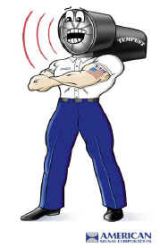
tba
Products
Outdoor Notification (Outdoor Warning Sirens)
Electronic sirens
Alertronic
Main article: ACA Alertronic
The Alertronic was a series of sirens carried over from ACA. Under ASC, the Alertronic line would remain largely the same as it was during the ACA era, though with several minor changes, such as now adorning ASC's standard light gray paint and nomenclature changes, particularly in 1994 when the Quadren would be renamed to the i-FORCE and the AR-1600 would be renamed to the RE-1600. The Alertronic line would remain unchanged for the rest of its lifespan before being phased out in 2011.

AL-1000
The AL-1000 is a directional electronic sirens, which are essentially an AL-4000 cut in half. They make use of 4 Atlas CJ-46 fiberglass paging horns attached to a rectangular aluminum housing which contains the wiring and speaker drivers. The AL-1000 uses 4 100 W speaker compression drivers, with one attached to each horn, for a total of 400 W. There is a removable panel on one side of the siren, which allows access to the internals. The design of the AL-1000 allowed for different directional configurations by removing speakers on one or more sides. The AL-1000 reaches 108 dB at 100 ft.
AL-2000
The AL-2000 is a directional electronic sirens, which are essentially an AL-4000 cut in half. They make use of 4 Atlas CJ-46 fiberglass paging horns attached to a rectangular aluminum housing which contains the wiring and speaker drivers. The AL-2000 is visually identical to the AL-1000, but differs on the inside by doubling the number of drivers, with 2 100 W drivers per horn for a total of 800 W. There is a removable panel on one side of the siren, which allows access to the internals. The design of the AL-1000 and AL-2000 allowed for different directional configurations by removing speakers on one or more sides. The AL-2000 reaches 112 dB at 100 ft.

AL-4000
The AL-4000 is a directional electronic siren, and was advertised as a cheaper alternative to the Alertronic 5000 when it was first released. The AL-4000 is a simple electronic siren, with 8 Atlas CJ-47 fiberglass paging horns attached to a cubical aluminum housing which contains the wiring and speaker drivers. The AL-4000 was available without the square housing, with each speaker array's drivers being contained in individual smaller housings. This made it able to face in more than 4 directions, and made it look very similar to a DSA or WS-2000. The AL-4000 contains 16 100 W speaker drivers, with two attached to each horn for a total of 1600W. There are 2 horns on each side of the housing. There is a removable panel on one side of the siren, which allows access to the internals, and the design of this siren allowed for different directional configurations by removing speakers on one or more sides. The AL-4000 reaches 116 dB at 100 ft.
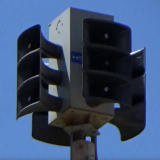
AL-6000
The AL-6000 is directional electronic siren, essentially being an AL-8000 with the top 4 speakers removed. It shares the same housing as the AL-8000 to save on costs. Due to this, the horn mounts are visible where the horns would have been mounted. The AL-6000 makes use of 12 Atlas CJ-46 fiberglass paging horns attached to a tall rectangular aluminum housing, with three horns on each side. The siren used 2 100 W speaker compression drivers per horn, for a total of 2400 W. There is a removable panel on one side of the siren, which allows access to the internals, and the design of this siren allowed for different directional configurations by removing speakers on one or more sides. The AL-6000 reaches 121 dB at 100 ft.
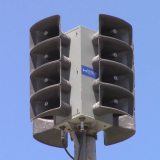
AL-8000
The AL-8000 is the largest directional siren in the Alertronic series, essentially being two AL-4000s stacked on top of each other with a single rectangular housing. The AL-8000 shares the same housing as the AL-6000 which contains the siren's wiring and drivers, with 16 Atlas CJ-46 fiberglass paging horns attached to the housing, 4 horns being on each side. The siren uses 32 100 W speaker compression drivers, with 2 drivers attached to each horn, for a total of 3200 W. There is a removable panel on one side of the siren, which allows access to the internals, and the design of this siren allowed for different directional configurations by removing speakers on one or more sides. The AL-8000 reaches 126 dB at 100 ft.

RE-1600
The RE-1600 is a rotational electronic siren, utilizing high-powered speaker drivers located in the back panel of the siren to amplify the sounds from the controller. The RE-1600 uses 16 100 W drivers for a total of 1600 W, with two drivers paired into each of the siren's 4 "throats" which connect to the siren's singular horn and allows the siren to reach 125 dB at 100 ft. The siren is rotated with a separate motor and gear reduction drive which drives a chain inside of the lower enclosure that rotates the entire siren unit 360°. The RE-1600 makes use of collector rings, which means it doesn't have to oscillate. However, this also means that the siren may cut out or glitch if the rings are dirty.
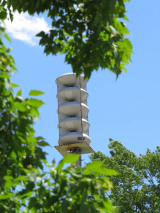
Quadren
Main article: ASC i-FORCE
Originally released in 1992, the Quadren was a very unique siren designed to act as both a directional and an omnidirectional siren, whichever is required. While similar in appearance to a Modulator or a Whelen omnidirectional, its internal design is completely different. Unlike other stacked-cell sirens, the Quadren only has speaker compression drivers in every other cell, with the sound being projected out of both the top and bottom of each active cell using horns inside the cells. Each active cell has half of a dummy cell on the top and bottom which forms an entire dummy cell in between each active cell when stacked, which forms the projectors through its shape. Each active cell quadrant has a removable panel to easily access and replace faulty drivers. Each active cell in a Quadren is formed by four separate quadrants, which when 4 of them are put together form an entire cell. The Quadren would be sold until 2005, when it was redesigned to its current form, the ASC i-FORCE.
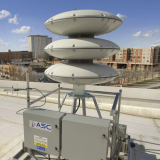
i-FORCE
Main article: ASC i-FORCE
Originally known as the Quadren, the i-FORCE is a series of omnidirectional electronic sirens that were redesigned to their current form in 2005. Each active cell contains 8 Atlas 100 W drivers, with a "dummy" bottom cell that projects the sound from the lowest active cell. The i-FORCE is available with up to 4 active cells, for a total of 3200 W. There are 4 models available, the STi-800, STi-1600, STi-2400, and STi-3200. ASC also refers to these sirens as simply the i-FORCE 800, 1600, 2400, and 3200. The i-FORCE runs on 24 V DC, and is voice and battery backup capable. The i-FORCE continues to be sold to this day and is the least popular out of the stacked-cell electronic sirens. However, it still performs strongly, and ASC appears to be hard at work improving upon the design according to teasers from the company itself.
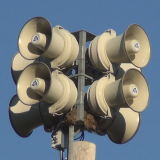
E-Class
Main article: ASC E-Class
The E-Class is a series of directional electronic sirens that is produced by the American Signal Corporation. Very similar in appearance to the ATI HPSS (and often confused with such), the E-Class is ASC's budget electronic siren offering. The E-Class series was introduced sometime around 2007, as a cheaper electronic alternative to the i-FORCE. These sirens make use of 1-8 speakers per array, with a maximum of 8 speakers being supported. The speakers were supplied by DKTec, based out of Taiwan, and are the same speakers used for many other electronic sirens. Each speaker contains 4 100 W speaker compression drivers, manufactured by Atlas, with a maximum of 3200 W being supported. Each unit comes with a standard ASC controller, which includes battery backup and voice capabilities alongside ASC's standard siren tones. These sirens are not very common as ASC has failed to establish themselves into the electronic siren market as effectively as its competitors such as Whelen's WPS-2900 and Federal Signal's Modulator and DSA, but where they are found, they are quite effective. Due to their better controller and drivers, these sirens often outperform and are more reliable than their closest competitor, the ATI HPSS series.
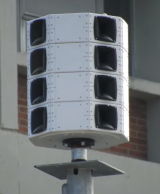
Clarity
Main article: ASC Clarity
The Clarity is an electronic siren produced by American Signal Corporation, and is the newest siren produced by the company as of 2023. The Clarity is designed as cheap alternative to the E-Class and i-FORCE, as its small size allows it to be shipped through standard shipping instead of by trailer, weighing less than 30 pounds. The Clarity is designed with voice clarity in mind over raw performance and is mainly meant for campus and office park use. The Clarity consists of 4-16 JBL Selenium HM17-25 speakers inside of an octagonal frame. While these speakers cannot output the same volume that purpose-built siren speakers can, the tradeoff is excellent voice clarity at both near and long range. This makes it perfectly suitable as a campus siren, which is its target market. The speakers likely use JBL's titanium speaker drivers, which are rated for 100 W each. This means the Clarity ranges from a 400 W to 1600 W siren. The Clarity is a direct competitor to Sentry's SV-8 campus siren, which is similarly small, inexpensive, and with a focus on voice capabilities.
Mechanical sirens
Omnidirectional Mechanical (OM)
Main articles: ACA Screamer, ACA Banshee
The Omnidirectional Mechanical (OM) series was ASC's rebranding of ACA's Screamer and Banshee lines of sirens, streamlining and combining both into one series. The OM series included the OM-102 (Screamer S-2), OM-109 (S-5), OM-112 (S-7.5), OM-117 (Banshee 115) and OM-120 (Performance Plus Banshee). The streamlining included the discontinuation of the Screamer S-10 (which was redundant) and the 9/12-port dual tone option on the Banshee 115. OM series sirens are largely identical to their ACA counterparts, though painted in light gray with ASC's blue rectangular logo. The OM series was discontinued in 2004, being replaced by the Tempest line of sirens.
OM-102 (Screamer S-2)
The OM-102 is ASC's rebranded version of the Screamer S-2. The OM-102 is identical to the Screamer S-2 besides its paint, which is gray in colour. The OM-102 consists of a 9-port single tone rotor and stator driven by a 2.5 hp AC electric motor. The OM-102 was available in single or three-phase.
OM-109 (Screamer S-5)
The OM-109 is ASC's rebranded version of the Screamer S-5. The OM-102 is identical to the Screamer S-5 besides its paint, which is gray in colour. The OM-102 consists of a 9-port single tone rotor and stator driven by a 5 hp AC electric motor. The OM-102 was available in single or three-phase.
OM-112 (Screamer S-7.5)
The OM-112 is ASC's rebranded version of the Screamer S7.5. The OM-102 is identical to the Screamer S-7.5 besides its paint, which is gray in colour. The OM-102 consists of a 9-port single tone rotor and stator driven by a 7.5 hp AC electric motor. The OM-102 was available in single or three-phase.
OM-117 (Banshee 115)
The OM-117 is ASC's rebranded version of the Banshee 115. The OM-117 is identical to the Banshee 115 besides its paint which is gray in colour. The OM-102 consists of an 8-port single tone rotor and stator driven by a 10 hp AC electric motor. Unlike the Banshee 115, the OM-117 was not offered in 9/12-port dual tone. The OM-117 was available in single or three-phase.
OM-120 (Performance Plus Banshee)
The OM-120 is ASC's rebranded version of the Performance Plus Banshee. The OM-120 is identical to the Performance Plus Banshee besides its paint which is gray in colour. The OM-120 is a DC siren designed to run on battery backup, using a 7.5 hp 72 V DC motor which to allow it to run on batteries. The OM-120 consists of a 9-port single tone rotor and stator borrowed from the Screamer S-7.5.
Cyclone 125 (C-125)
Main article: ACA Cyclone
Also known as the C-125AC, C-125 was ASC's rebranding of the Cyclone 125, and is identical in every way to a Cyclone 125 besides ASC's standard light gray paint. The C-125 is a simple siren in design, with the intake being on the bottom where the siren is mounted. It uses an 8/12-port dual tone rotor and stator, with the motor being located on top. This design is heavy and has a lot of drag when spinning, which requires the siren to use a very powerful 50 horsepower motor. The siren's rotor and stator are directional to improve sound output when the rotor is spinning the right way, but if the motor is wired backwards (reverse wired) then air will be restricted to the rotor and the siren will be much quieter, sounding muffled. The C-125 was discontinued in 2007 due to its high power requirements and lack of sales.
Rotational Mechanical (RM)
Main article: ACA Penetrator
The Rotational Mechanical (RM) series was ASC's rebranding of ACA's Penetrator series beginning production in 1994, which included the RM-127 (P-15), RM-130 (P-20) and RM-135 (P-50). The lineup was streamlined, with the Penetrator-10 discontinued likely due to being redundant. ASC also discontinued 9/12-port dual tone as an option for the P-15, as the 8-port single tone option was superior in performance. RM-Series sirens are largely identical to their ACA counterparts, though painted in light gray with ASC's blue rectangular logo. The RM series was discontinued in 2002 after the Tempest line of sirens was introduced just a few years before. The RM-135 was rebranded to the T-135AC, while the other two sirens were discontinued.
RM-127 (Penetrator-15)
The RM-127 is ASC's rebranded version of the Penetrator-15. The RM-127 is identical to the P-15 besides its paint which is gray in colour. The RM-127 consists of an 8-port single tone rotor and stator driven by a 15 hp AC electric motor. The siren is rotated by a chain-driven rotator underneath the siren. Unlike the P-15, the RM-127 was not offered in 9/12-port dual tone. The RM-127 was available in single or three-phase. ASC did not continue offering the 10-horsepower Penetrator-10.
RM-130 (Penetrator-20)
The RM-130 is ASC's rebranded version of the Penetrator-20. The RM-127 is identical to the PN-20 besides its paint which is gray in colour. The RM-130 consists of an 9-port single tone rotor and stator borrowed from the Screamer S7.5, driven by a 20 hp 72 V DC electric motor. The siren is rotated by a chain-driven rotator underneath the siren. The RM-130 is a DC siren, able to operate on batteries. The RM-130 was a considerable improvement over the PN-20, no longer needing a DC-to-AC converter.
RM-135 (Penetrator-50)
The RM-135, later known as the Tempest-135AC, is ASC's rebranded version of the Penetrator-50. The RM-135 is identical to the P-50 with the exception of the addition of the blue ASC badge on the rotator. The RM-135 consists of an 8/12-port dual tone rotor and stator driven by a 50 hp AC electric motor. The siren's massive projector is rotated by a chain-driven rotation mechanism. The RM-135, along with the C-125, were ASC's only dual tone sirens sold.
Tempest
Main article: ASC Tempest
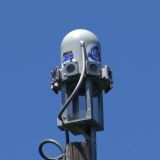
Tempest-112 (T-112)
The Tempest-112 is a small omnidirectional siren that is the cheapest and most basic of the Tempest series. It was introduced into ASC's lineup in 1998, alongside the Tempest-121 and Tempest-128. The T-112 is essentially just a T-121 that has had its horns removed and is the core of every Tempest siren. Like the rest of the Tempest series, the T-112 is exclusively 8-port single tone. Running on a 7 hp 48 V DC motor, the T-112 manages to reach 113 dB at 100 ft, despite the lack of horns.
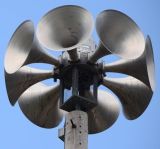
Tempest-121 (T-121)
The Tempest-121 is the best omnidirectional siren in the Tempest series, being a Tempest-112 with 8 round exponential horns attached to the extended stator ports. Like the rest of the Tempest series, the T-121 is exclusively 8-port single tone. The T-121 runs on the same 7 hp 48 V DC motor as the T-112, but the horns significantly increase its volume and range and allow it to reach 121 dB at 100 ft, significantly more than the T-112.
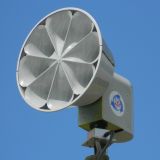
Tempest-128 (T-128)
The Tempest-128 is a precision rotational siren, which is essentially a rotating directional Tempest-121. The T-128 uses an 8-port rotor driven by a 7 hp 48 V DC motor located in the rear housing, identical to that of the T-112. Eight large L-shaped horns are directly bolted to the stator ports, which forces the sound up and out of the front of the siren directly, which greatly increases sound output and range, and allowing the siren to boast a sound output of 129.9 dB at 100 ft. The Tempest-128 is the sole remaining ACA-era siren sold by ASC, having been designed by ACA in 1993.
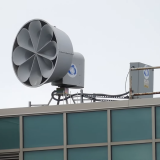
Tempest-135 AC/DC (T-135AC/DC)
The Tempest-135AC/DC is the largest of the Tempest series, being a Tempest-128 with a significantly larger rotor and stator (roughly the size of the Penetrator-15's rotor), larger horns, enlarged projector shroud, and using a much stronger 20 hp 72 V DC motor. This allows the siren to reach 133.5 dB at 100 ft. The T-135AC/DC is otherwise identical to a T-128. The T-135AC/DC was introduced in 2006 to replace the aging T-135AC, which was a rebranded ACA Penetrator-50, which holds the title for loudest electromechanical rotating siren to this day but lacks battery backup capabilities and consumes 480 V AC of power. The T-135AC/DC is not as loud as the T-135AC but is only 1.5 decibels shy of it while boasting battery backup, longer range, and DC power capabilities to make up for it, and it is currently the loudest rotating mechanical siren produced today, unless Lion King's claim about their DEFENDER is to be believed.
Interior Notification Systems (Interior Mass Notification Systems)
Controls and Speakers
RCM 15-T
WASI
WASI-15-T
WASI-30-T
WASI-100
WASO-100
EXPL-T
EXPL-30-T
EXPL-60-T
Siren Controllers
Compulert
tba
Software
tba